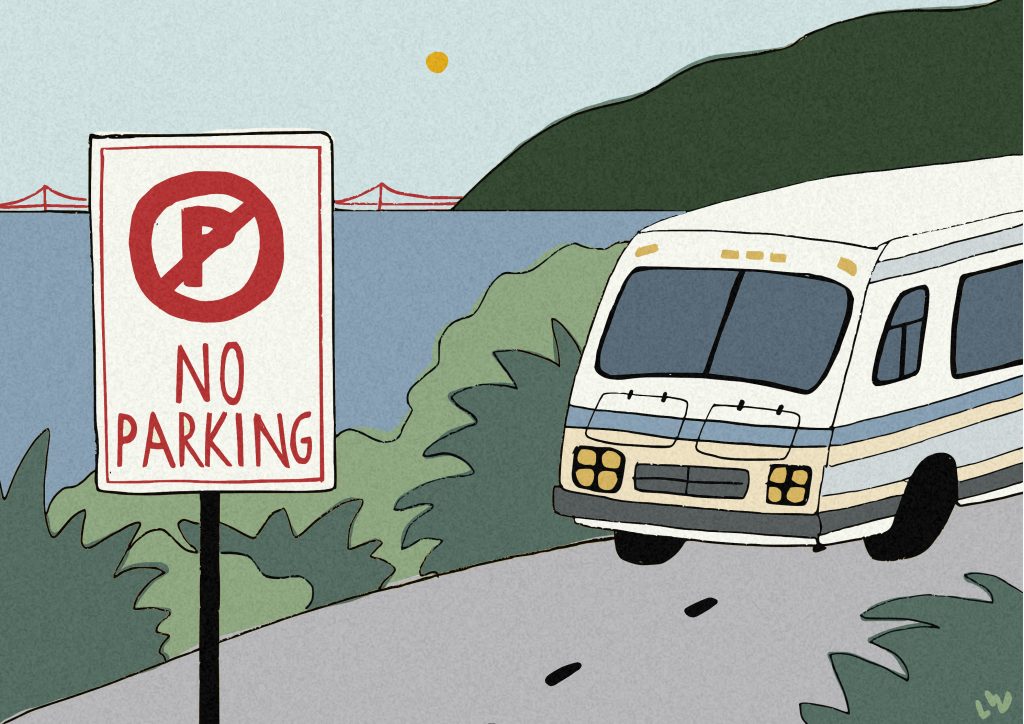
In 2019, Berkeley’s Point-in-Time count found over 300 Berkeley residents—nearly one third of the unhoused population—were living in a vehicle. While more recent counts have been on hold due to the pandemic, anyone who is paying attention will have noticed a dramatic increase in unsheltered residents on our streets. For many people facing housing insecurity or experiencing houselessness, living in a vehicle is often the best option. A vehicle provides a place to store your belongings securely, to get out of the wind and rain, to sleep off the cold cement, to avoid criminalization under Berkeley’s stringent Sidewalk Ordinances, and ultimately to live with more autonomy.
In the face of the devastating housing affordability and shelter crisis (recently extended to January 19, 2024, at the Berkeley city council meeting on January 18, 2022) the City of Berkeley intends to make living in one’s vehicle a logistical nightmare and excessively costly, through a complex web of parking regulations and other local municipal codes that bury people in fines. While some of these laws may have been established by the city council under seemingly well-intentioned pretexts, the reality of their enforcement has been nothing short of anti-homeless.
For instance, the 72- hour time limit (BMC 14.36.050) applies everywhere in Berkeley, and is a common cause for being “red tagged” and having the vehicle impounded. This municipal code is often enforced through 311 complaints, and any complaint-based enforcement system tends to discriminate against low-income and houseless people because the force of anti-homelessness in our society is strong.
The 2:00-5:00 a.m. parking ban (BMC 14.40.120), which also applies everywhere in Berkeley, was originally justified in 1952 to deter long-distance cargo truck drivers from using this city as a rest stop. However, the municipal code was updated in March 2019 to explicitly include RVs. Before the 2019 amendment, RV residents were already targeted using this commercial vehicle ordinance, causing people to have to drive in the middle of the night to secluded areas to avoid citations. These parking tickets would not specify the municipal code in violation, as it is not listed on the parking schedule of fees, but they began at $60 and accrued late fees up to $175.
A major way tickets can pile up is being cited for expired registration. Instead of a waiver or support program that helps unhoused residents stay on top of this paperwork, the city fines and impounds their vehicles without notice. To retrieve a vehicle from the towing yard, residents have to pay all outstanding fines, plus the towing fee, storage fee, and fee for the police release. Without including the outstanding tickets, these fees can add up to more than $600, even if it only sits in the lot for a day or two. Outstanding tickets can add up into the thousands, collecting late fees. One thing is certain: these fines impose disproportionate municipal debt on low-income and unhoused Berkeleyans. By selectively enforcing municipal codes on vehicles being used as homes, and piling fines onto vehicle owners already struggling to make ends meet, the City of Berkeley sends a clear message to low-income and housing-insecure residents of Berkeley—you are not welcome here.
Some residents, however, are coming together to fight back and tell the city they will not be pushed further to the margins. Individuals living in vehicles in the Gilman District have taken legal action against what they feel constitutes selective enforcement. They are part of a curbside community, Berkeley Friends on Wheels, that has made the intersection of Eighth and Harrison Streets its home since August of 2018. Now, 10 members have filed a class action lawsuit against multiple city departments citing violations to their civil rights under the 1st, 4th, 8th, and 14th amendments. Their formal written complaint argues that the City of Berkeley engages in selective enforcement of parking regulations “based on the actual or perceived homelessness of the person(s) residing in the vehicle at the time.”
According to the city, these selective enforcements are justified by what they consider to be a reasonable alternative: uprooting the community for certain eligible individuals to move to the new “safe parking” lot (S.P.A.R.K.)—a temporary program which is currently slated to end less than eight months from now in September 2022, and which offers no housing navigation services. Meanwhile, as the case unfolds, the community continues to be cited, including for four-hour parking time-limit violations, even though the new parking signs do not cite any existing municipal code to explain the violation.
No one should be discriminated against for their housing status, and the City of Berkeley could consider providing services to already-existing communities, rather than using coercive tactics to try to make unhoused residents disappear.
Read updates at berkeleycopwatch.org/news
Get active. Be aware. Refuse to be abused.
Berkeley Copwatch is an all-volunteer organization with the goal to reduce police violence through direct observation and holding police accountable for their actions. Formed in 1990, they seek to educate the public about their rights, police conduct in the Berkeley community and issues related to the role of police in our society at large. For more information visit www.berkeleycopwatch.org.
